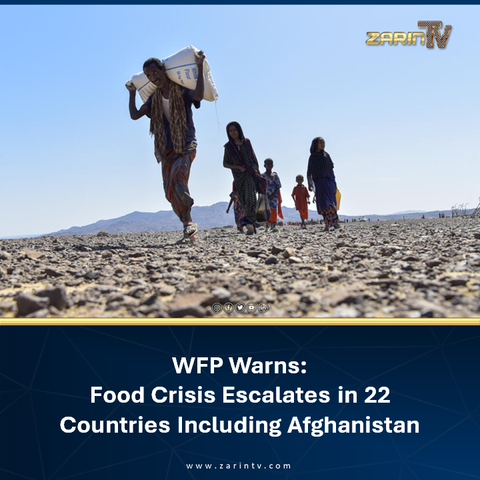COP30: Climate Extremes Are Already Impacting Food Yields Today
#Environment #ClimateChange #Biodiversity #COP30 #FoodSecurity #Agriculture #SustainableFarming #FAO #IndigenousKnowledge #GlobalHunger #ClimateAction #The14 #ResilientFarms #ClimateCrisis
https://the-14.com/cop30-climate-extremes-are-already-impacting-food-yields-today/
#GlobalHunger
WFP: Ending global hunger by 2030 achievable at less than 1% of military budgets http://newsfeed.facilit8.network/TPMstv #EndHunger #GlobalHunger #ZeroHunger #WFP #FoodSecurity
Africa: WFP Prioritises Feeding 110 Million of the Hungriest in 2026: [Capital FM] Rome -- The world is facing a global hunger crisis with inadequate resources to respond, the United Nations World Food Programme (WFP) warned today. http://newsfeed.facilit8.network/TPLS6W #HungerCrisis #WorldFoodProgramme #FoodSecurity #GlobalHunger #FightHunger
South Sudan: Food security experts warn of worsening hunger crisis http://newsfeed.facilit8.network/TP5PsX #SouthSudan #FoodSecurity #HungerCrisis #Sustainability #GlobalHunger
Global hunger monitor confirms famine in two Sudanese cities http://newsfeed.facilit8.network/TP3kVV #HungerCrisis #Sudan #Famine #GlobalHunger #HumanRights
Pope Leo XIV warns world leaders against indifference to global hunger http://newsfeed.facilit8.network/TNjd3x #PopeLeoXIV #GlobalHunger #WorldFoodDay #EndHunger #FoodSecurity
Africa: Why Are Over 670 Million People Going Hungry?: [UN News] More than eight per cent of the world population or around 673 million people are not getting enough to eat and going hungry, according to the UN. http://newsfeed.facilit8.network/TNhCJ3 #HungerCrisis #FoodSecurity #UNReport #Africa #GlobalHunger
UN Secretary-General Guterres has called for urgent international aid to Haiti, where millions face severe humanitarian crises due to political instability, economic collapse, and rampant violence. With less than 10% of the required $908 million in funding secured, Haiti remains one of the world’s most neglected hunger hotspots. #HaitiCrisis #HumanitarianAid #UN #Guterres #GlobalHunger #EmergencyResponse 🌍💔🆘
Global hunger is declining—but conflict and climate change threaten that fragile progress, warns the UN. Reuters reports on the stakes. #FoodSecurity #ClimateImpact #GlobalHunger https://www.reuters.com/world/global-hunger-falls-conflict-climate-threaten-progress-un-says-2025-07-28/
UN warns of rising hunger in Africa amid global decline http://newsfeed.facilit8.network/TM9RnY #HungerCrisis #FoodSecurity #UNReport #AfricaRising #GlobalHunger
Africa: Global Hunger Declines, but Rises in Africa and Western Asia - UN Report: [WFP] This year's The State of Food Security and Nutrition in the World report also examines the causes and consequences of recent food inflation Addis Ababa -- An estimated 8.2 percent of the global population, or about 673 million people, experienced hunger in 2024, down from 8.5 percent in 2023 and 8.7 percent in 2022. However,… http://newsfeed.facilit8.network/TM9RQF #GlobalHunger #FoodSecurity #Nutrition #Africa #WesternAsia
Africa: Slight Decrease in Global Hunger As Inequalities Widen, Says UN Interagency Report: [UN News] An interagency group from the UN released the flagship 2025 State of Food Security and Nutrition in the World (SOFI) report on Monday, estimating a global, yet uneven, decline in hunger since 2022. http://newsfeed.facilit8.network/TM9Qg7 #Hunger #FoodSecurity #Nutrition #UNReporting #GlobalHunger
Africa: Without Urgent Funding, Global Hunger Hotspots Are Set to Grow, UN Warns: [UN News] Since conflict erupted in Sudan, more than a million people have fled to neighbouring South Sudan, seeking refuge from escalating violence that has displaced 12.4 million people and plunged over half the Sudanese population into food insecurity. http://newsfeed.facilit8.network/TLP6pJ #Africa #GlobalHunger #FoodSecurity #SudanCrisis #Refugees
Global hunger worsened in 2024, affecting 295 mln people: UN report http://newsfeed.facilit8.network/TKqX7s #GlobalHunger #FoodInsecurity #Malnutrition #UNReport #FAO
Why Donald Trump’s trade tariffs are a threat to global food security
#World #GlobalMarkets #Trump #TrumpTariffs #Tariffs #FoodSecurity #GlobalHunger #TradeWar #FertilizerCrisis #FoodPrices #DevelopingNations #TariffImpact #FoodCrisis #GlobalInequality
https://the-14.com/why-donald-trumps-trade-tariffs-are-a-threat-to-global-food-security/
Africa: Food Insecurity an Unprecedented Crisis Worldwide: [IPS] Baltimore, Maryland -- Last year, 343 million people were experiencing acute food insecurity, according to the World Food Programme (WFP). That's 10 percent higher than in 2023. http://newsfeed.facilit8.network/TKBH7R #FoodInsecurity #HungerCrisis #GlobalHunger #WFP #AfricanIssues
US food purchases for foreign aid halted despite waiver -freezes purchases of wheat, soybeans... prod. by US farmers could hinder/halt the ops. of orgs that provide Ms of tons of food/yr to help alleviate poverty in Madagascar, Tanzania... +added pain for US farmers...
Sources: requested anonymity for fear of RETRIBUTION.
"Could definitely lead to more vulnerable pops. not being able to access food -hurts our supply chains."
Barbaric, subversive...
#USPol #GlobalHunger https://www.msn.com/en-us/news/us/exclusive-us-food-purchases-for-foreign-aid-halted-despite-waiver-sources-say/ar-AA1ysuZY
Over 150 Nobel laureates call for urgent action to ramp up food production and avoid a global hunger catastrophe, citing challenges like climate change and conflict.
#nobellaureates #globalhunger #tgcnews #globalcommonsnews #globalcommons
Looters target a major aid convoy in Gaza, exacerbating food shortages for millions already facing famine | TGC News.
#GazaAidCrisis #LootingInGaza #FoodShortages #GazaFamine #HumanitarianCrisis #TGCNews #AidInterruption #MiddleEastConflict #GazaRelief #GlobalHunger
The World Food Program (WFP) has announced a growing food security crisis across 22 countries, including Afghanistan.
https://zarintv.com/english/202410319223
#FoodCrisis #WFP #GlobalHunger #Humanitarian #FoodSecurity #Afghanistan #UnitedNations












